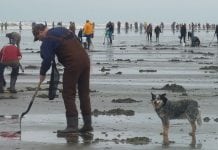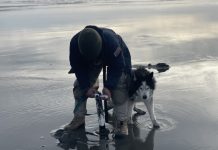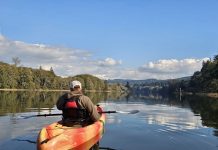This calendar is the place to find fun events happening throughout Grays Harbor County including Aberdeen, Hoquiam, Westport, Ocean Shores, Elma, Montesano and beyond.
Have an event that isn’t listed? Please email events@GraysHarborTalk.com with the following information:
- Name of Event
- Date, time and location (name of business if applicable and complete address)
- Organizer(s) name
- Cost
- URL to purchase tickets
- Website URL
- SHORT description of event
- Photo
Our editors will review and post within a few business days.
WDFW approves seven days of coastal razor clam digs beginning Oct. 24
OLYMPIA – Washington Department of Fish and Wildlife (WDFW) shellfish managers confirmed today razor clam digging opportunities at Long Beach, Twin Harbors, and Copalis beaches from Oct. 24-30.
“Digging should continue to be great on the open beaches,” said Dan Ayres, WDFW coastal shellfish manager. “Most of the 26,000 harvesters who went out during the recent opener found easy digging, and if the weather cooperates, we’re expecting more of the same.”
The following digs during evening (p.m.) low tides will proceed as scheduled, after marine toxin results from the Washington Department of Health (DOH) showed razor clams are safe to eat:
- Oct. 24, Monday, 6:44 p.m.; 0.0 feet; Long Beach, Twin Harbors, Copalis
- Oct. 25, Tuesday, 7:24 p.m.; -0.6 feet; Long Beach, Twin Harbors
- Oct. 26, Wednesday, 8:05 p.m.; -1.0 feet; Long Beach, Twin Harbors, Copalis
- Oct. 27, Thursday, 8:48 p.m.; -1.1 feet; Long Beach, Twin Harbors
- Oct. 28, Friday, 9:35 p.m.; -1.0 feet; Long Beach, Twin Harbors, Copalis
- Oct. 29, Saturday, 10:28 p.m.; -0.7 feet; Long Beach, Twin Harbors
- Oct. 30, Sunday, 11:27 p.m.; -0.3 feet; Long Beach, Twin Harbors, Copalis
The latest marine toxin levels at Mocrocks beaches were below the health guideline level. However, DOH requires two test samples taken 10 days apart, must fall under the health guideline level before a beach can reopen for razor clam digging.
WDFW conducted summer assessments showing a strong razor clam population except at Kalaloch, which is closed for 2022-2023 season. More tentative dates are planned on Nov. 6-13 and Nov. 22-28 (including the Thanksgiving holiday), and during December. Final approval is usually announced about one week prior to each digging series.
Not all beaches are open for every dig, so diggers are encouraged to make sure their intended destination is open before heading out. The most successful digging occurs between one and two hours before the listed time of low tide.
Digging is prohibited in the razor clam reserves, which are marked by 10-foot poles with signs. The reserves are located just south of the Ocean City approach on Copalis; and 2.8 miles north of the Oysterville approach on Long Beach.
The daily limit is 15 razor clams per person. Under state law, a daily limit consists of the first 15 clams dug regardless of size or condition, and each digger’s clams must be kept in a separate container.
All diggers age 15 or older must have an applicable fishing license to harvest razor clams on any beach. Licenses may be purchased on WDFW’s licensing website, and from hundreds of license vendors around the state. Options include a three-day razor clam license to an annual combination fishing license. WDFW recommends buying your license before visiting coastal beach communities.
For more information on future tentative digs, go to the WDFW’s razor clam webpage. The updated 2022-23 Razor Clam Management Plan is available on the WDFW’s website.
The Washington Department of Fish and Wildlife works to preserve, protect, and perpetuate fish, wildlife and ecosystems while providing sustainable fish and wildlife recreational and commercial opportunities.
WDFW approves seven days of coastal razor clam digs beginning Oct. 24
OLYMPIA – Washington Department of Fish and Wildlife (WDFW) shellfish managers confirmed today razor clam digging opportunities at Long Beach, Twin Harbors, and Copalis beaches from Oct. 24-30.
“Digging should continue to be great on the open beaches,” said Dan Ayres, WDFW coastal shellfish manager. “Most of the 26,000 harvesters who went out during the recent opener found easy digging, and if the weather cooperates, we’re expecting more of the same.”
The following digs during evening (p.m.) low tides will proceed as scheduled, after marine toxin results from the Washington Department of Health (DOH) showed razor clams are safe to eat:
- Oct. 24, Monday, 6:44 p.m.; 0.0 feet; Long Beach, Twin Harbors, Copalis
- Oct. 25, Tuesday, 7:24 p.m.; -0.6 feet; Long Beach, Twin Harbors
- Oct. 26, Wednesday, 8:05 p.m.; -1.0 feet; Long Beach, Twin Harbors, Copalis
- Oct. 27, Thursday, 8:48 p.m.; -1.1 feet; Long Beach, Twin Harbors
- Oct. 28, Friday, 9:35 p.m.; -1.0 feet; Long Beach, Twin Harbors, Copalis
- Oct. 29, Saturday, 10:28 p.m.; -0.7 feet; Long Beach, Twin Harbors
- Oct. 30, Sunday, 11:27 p.m.; -0.3 feet; Long Beach, Twin Harbors, Copalis
The latest marine toxin levels at Mocrocks beaches were below the health guideline level. However, DOH requires two test samples taken 10 days apart, must fall under the health guideline level before a beach can reopen for razor clam digging.
WDFW conducted summer assessments showing a strong razor clam population except at Kalaloch, which is closed for 2022-2023 season. More tentative dates are planned on Nov. 6-13 and Nov. 22-28 (including the Thanksgiving holiday), and during December. Final approval is usually announced about one week prior to each digging series.
Not all beaches are open for every dig, so diggers are encouraged to make sure their intended destination is open before heading out. The most successful digging occurs between one and two hours before the listed time of low tide.
Digging is prohibited in the razor clam reserves, which are marked by 10-foot poles with signs. The reserves are located just south of the Ocean City approach on Copalis; and 2.8 miles north of the Oysterville approach on Long Beach.
The daily limit is 15 razor clams per person. Under state law, a daily limit consists of the first 15 clams dug regardless of size or condition, and each digger’s clams must be kept in a separate container.
All diggers age 15 or older must have an applicable fishing license to harvest razor clams on any beach. Licenses may be purchased on WDFW’s licensing website, and from hundreds of license vendors around the state. Options include a three-day razor clam license to an annual combination fishing license. WDFW recommends buying your license before visiting coastal beach communities.
For more information on future tentative digs, go to the WDFW’s razor clam webpage. The updated 2022-23 Razor Clam Management Plan is available on the WDFW’s website.
The Washington Department of Fish and Wildlife works to preserve, protect, and perpetuate fish, wildlife and ecosystems while providing sustainable fish and wildlife recreational and commercial opportunities.
WDFW approves seven days of coastal razor clam digs beginning Oct. 24
OLYMPIA – Washington Department of Fish and Wildlife (WDFW) shellfish managers confirmed today razor clam digging opportunities at Long Beach, Twin Harbors, and Copalis beaches from Oct. 24-30.
“Digging should continue to be great on the open beaches,” said Dan Ayres, WDFW coastal shellfish manager. “Most of the 26,000 harvesters who went out during the recent opener found easy digging, and if the weather cooperates, we’re expecting more of the same.”
The following digs during evening (p.m.) low tides will proceed as scheduled, after marine toxin results from the Washington Department of Health (DOH) showed razor clams are safe to eat:
- Oct. 24, Monday, 6:44 p.m.; 0.0 feet; Long Beach, Twin Harbors, Copalis
- Oct. 25, Tuesday, 7:24 p.m.; -0.6 feet; Long Beach, Twin Harbors
- Oct. 26, Wednesday, 8:05 p.m.; -1.0 feet; Long Beach, Twin Harbors, Copalis
- Oct. 27, Thursday, 8:48 p.m.; -1.1 feet; Long Beach, Twin Harbors
- Oct. 28, Friday, 9:35 p.m.; -1.0 feet; Long Beach, Twin Harbors, Copalis
- Oct. 29, Saturday, 10:28 p.m.; -0.7 feet; Long Beach, Twin Harbors
- Oct. 30, Sunday, 11:27 p.m.; -0.3 feet; Long Beach, Twin Harbors, Copalis
The latest marine toxin levels at Mocrocks beaches were below the health guideline level. However, DOH requires two test samples taken 10 days apart, must fall under the health guideline level before a beach can reopen for razor clam digging.
WDFW conducted summer assessments showing a strong razor clam population except at Kalaloch, which is closed for 2022-2023 season. More tentative dates are planned on Nov. 6-13 and Nov. 22-28 (including the Thanksgiving holiday), and during December. Final approval is usually announced about one week prior to each digging series.
Not all beaches are open for every dig, so diggers are encouraged to make sure their intended destination is open before heading out. The most successful digging occurs between one and two hours before the listed time of low tide.
Digging is prohibited in the razor clam reserves, which are marked by 10-foot poles with signs. The reserves are located just south of the Ocean City approach on Copalis; and 2.8 miles north of the Oysterville approach on Long Beach.
The daily limit is 15 razor clams per person. Under state law, a daily limit consists of the first 15 clams dug regardless of size or condition, and each digger’s clams must be kept in a separate container.
All diggers age 15 or older must have an applicable fishing license to harvest razor clams on any beach. Licenses may be purchased on WDFW’s licensing website, and from hundreds of license vendors around the state. Options include a three-day razor clam license to an annual combination fishing license. WDFW recommends buying your license before visiting coastal beach communities.
For more information on future tentative digs, go to the WDFW’s razor clam webpage. The updated 2022-23 Razor Clam Management Plan is available on the WDFW’s website.
The Washington Department of Fish and Wildlife works to preserve, protect, and perpetuate fish, wildlife and ecosystems while providing sustainable fish and wildlife recreational and commercial opportunities.
WDFW approves seven days of coastal razor clam digs beginning Oct. 24
OLYMPIA – Washington Department of Fish and Wildlife (WDFW) shellfish managers confirmed today razor clam digging opportunities at Long Beach, Twin Harbors, and Copalis beaches from Oct. 24-30.
“Digging should continue to be great on the open beaches,” said Dan Ayres, WDFW coastal shellfish manager. “Most of the 26,000 harvesters who went out during the recent opener found easy digging, and if the weather cooperates, we’re expecting more of the same.”
The following digs during evening (p.m.) low tides will proceed as scheduled, after marine toxin results from the Washington Department of Health (DOH) showed razor clams are safe to eat:
- Oct. 24, Monday, 6:44 p.m.; 0.0 feet; Long Beach, Twin Harbors, Copalis
- Oct. 25, Tuesday, 7:24 p.m.; -0.6 feet; Long Beach, Twin Harbors
- Oct. 26, Wednesday, 8:05 p.m.; -1.0 feet; Long Beach, Twin Harbors, Copalis
- Oct. 27, Thursday, 8:48 p.m.; -1.1 feet; Long Beach, Twin Harbors
- Oct. 28, Friday, 9:35 p.m.; -1.0 feet; Long Beach, Twin Harbors, Copalis
- Oct. 29, Saturday, 10:28 p.m.; -0.7 feet; Long Beach, Twin Harbors
- Oct. 30, Sunday, 11:27 p.m.; -0.3 feet; Long Beach, Twin Harbors, Copalis
The latest marine toxin levels at Mocrocks beaches were below the health guideline level. However, DOH requires two test samples taken 10 days apart, must fall under the health guideline level before a beach can reopen for razor clam digging.
WDFW conducted summer assessments showing a strong razor clam population except at Kalaloch, which is closed for 2022-2023 season. More tentative dates are planned on Nov. 6-13 and Nov. 22-28 (including the Thanksgiving holiday), and during December. Final approval is usually announced about one week prior to each digging series.
Not all beaches are open for every dig, so diggers are encouraged to make sure their intended destination is open before heading out. The most successful digging occurs between one and two hours before the listed time of low tide.
Digging is prohibited in the razor clam reserves, which are marked by 10-foot poles with signs. The reserves are located just south of the Ocean City approach on Copalis; and 2.8 miles north of the Oysterville approach on Long Beach.
The daily limit is 15 razor clams per person. Under state law, a daily limit consists of the first 15 clams dug regardless of size or condition, and each digger’s clams must be kept in a separate container.
All diggers age 15 or older must have an applicable fishing license to harvest razor clams on any beach. Licenses may be purchased on WDFW’s licensing website, and from hundreds of license vendors around the state. Options include a three-day razor clam license to an annual combination fishing license. WDFW recommends buying your license before visiting coastal beach communities.
For more information on future tentative digs, go to the WDFW’s razor clam webpage. The updated 2022-23 Razor Clam Management Plan is available on the WDFW’s website.
The Washington Department of Fish and Wildlife works to preserve, protect, and perpetuate fish, wildlife and ecosystems while providing sustainable fish and wildlife recreational and commercial opportunities.
WDFW approves seven days of coastal razor clam digs beginning Oct. 24
OLYMPIA – Washington Department of Fish and Wildlife (WDFW) shellfish managers confirmed today razor clam digging opportunities at Long Beach, Twin Harbors, and Copalis beaches from Oct. 24-30.
“Digging should continue to be great on the open beaches,” said Dan Ayres, WDFW coastal shellfish manager. “Most of the 26,000 harvesters who went out during the recent opener found easy digging, and if the weather cooperates, we’re expecting more of the same.”
The following digs during evening (p.m.) low tides will proceed as scheduled, after marine toxin results from the Washington Department of Health (DOH) showed razor clams are safe to eat:
- Oct. 24, Monday, 6:44 p.m.; 0.0 feet; Long Beach, Twin Harbors, Copalis
- Oct. 25, Tuesday, 7:24 p.m.; -0.6 feet; Long Beach, Twin Harbors
- Oct. 26, Wednesday, 8:05 p.m.; -1.0 feet; Long Beach, Twin Harbors, Copalis
- Oct. 27, Thursday, 8:48 p.m.; -1.1 feet; Long Beach, Twin Harbors
- Oct. 28, Friday, 9:35 p.m.; -1.0 feet; Long Beach, Twin Harbors, Copalis
- Oct. 29, Saturday, 10:28 p.m.; -0.7 feet; Long Beach, Twin Harbors
- Oct. 30, Sunday, 11:27 p.m.; -0.3 feet; Long Beach, Twin Harbors, Copalis
The latest marine toxin levels at Mocrocks beaches were below the health guideline level. However, DOH requires two test samples taken 10 days apart, must fall under the health guideline level before a beach can reopen for razor clam digging.
WDFW conducted summer assessments showing a strong razor clam population except at Kalaloch, which is closed for 2022-2023 season. More tentative dates are planned on Nov. 6-13 and Nov. 22-28 (including the Thanksgiving holiday), and during December. Final approval is usually announced about one week prior to each digging series.
Not all beaches are open for every dig, so diggers are encouraged to make sure their intended destination is open before heading out. The most successful digging occurs between one and two hours before the listed time of low tide.
Digging is prohibited in the razor clam reserves, which are marked by 10-foot poles with signs. The reserves are located just south of the Ocean City approach on Copalis; and 2.8 miles north of the Oysterville approach on Long Beach.
The daily limit is 15 razor clams per person. Under state law, a daily limit consists of the first 15 clams dug regardless of size or condition, and each digger’s clams must be kept in a separate container.
All diggers age 15 or older must have an applicable fishing license to harvest razor clams on any beach. Licenses may be purchased on WDFW’s licensing website, and from hundreds of license vendors around the state. Options include a three-day razor clam license to an annual combination fishing license. WDFW recommends buying your license before visiting coastal beach communities.
For more information on future tentative digs, go to the WDFW’s razor clam webpage. The updated 2022-23 Razor Clam Management Plan is available on the WDFW’s website.
The Washington Department of Fish and Wildlife works to preserve, protect, and perpetuate fish, wildlife and ecosystems while providing sustainable fish and wildlife recreational and commercial opportunities.
WDFW approves seven days of coastal razor clam digs beginning Oct. 24
OLYMPIA – Washington Department of Fish and Wildlife (WDFW) shellfish managers confirmed today razor clam digging opportunities at Long Beach, Twin Harbors, and Copalis beaches from Oct. 24-30.
“Digging should continue to be great on the open beaches,” said Dan Ayres, WDFW coastal shellfish manager. “Most of the 26,000 harvesters who went out during the recent opener found easy digging, and if the weather cooperates, we’re expecting more of the same.”
The following digs during evening (p.m.) low tides will proceed as scheduled, after marine toxin results from the Washington Department of Health (DOH) showed razor clams are safe to eat:
- Oct. 24, Monday, 6:44 p.m.; 0.0 feet; Long Beach, Twin Harbors, Copalis
- Oct. 25, Tuesday, 7:24 p.m.; -0.6 feet; Long Beach, Twin Harbors
- Oct. 26, Wednesday, 8:05 p.m.; -1.0 feet; Long Beach, Twin Harbors, Copalis
- Oct. 27, Thursday, 8:48 p.m.; -1.1 feet; Long Beach, Twin Harbors
- Oct. 28, Friday, 9:35 p.m.; -1.0 feet; Long Beach, Twin Harbors, Copalis
- Oct. 29, Saturday, 10:28 p.m.; -0.7 feet; Long Beach, Twin Harbors
- Oct. 30, Sunday, 11:27 p.m.; -0.3 feet; Long Beach, Twin Harbors, Copalis
The latest marine toxin levels at Mocrocks beaches were below the health guideline level. However, DOH requires two test samples taken 10 days apart, must fall under the health guideline level before a beach can reopen for razor clam digging.
WDFW conducted summer assessments showing a strong razor clam population except at Kalaloch, which is closed for 2022-2023 season. More tentative dates are planned on Nov. 6-13 and Nov. 22-28 (including the Thanksgiving holiday), and during December. Final approval is usually announced about one week prior to each digging series.
Not all beaches are open for every dig, so diggers are encouraged to make sure their intended destination is open before heading out. The most successful digging occurs between one and two hours before the listed time of low tide.
Digging is prohibited in the razor clam reserves, which are marked by 10-foot poles with signs. The reserves are located just south of the Ocean City approach on Copalis; and 2.8 miles north of the Oysterville approach on Long Beach.
The daily limit is 15 razor clams per person. Under state law, a daily limit consists of the first 15 clams dug regardless of size or condition, and each digger’s clams must be kept in a separate container.
All diggers age 15 or older must have an applicable fishing license to harvest razor clams on any beach. Licenses may be purchased on WDFW’s licensing website, and from hundreds of license vendors around the state. Options include a three-day razor clam license to an annual combination fishing license. WDFW recommends buying your license before visiting coastal beach communities.
For more information on future tentative digs, go to the WDFW’s razor clam webpage. The updated 2022-23 Razor Clam Management Plan is available on the WDFW’s website.
The Washington Department of Fish and Wildlife works to preserve, protect, and perpetuate fish, wildlife and ecosystems while providing sustainable fish and wildlife recreational and commercial opportunities.
WDFW approves seven days of coastal razor clam digs beginning Oct. 24
OLYMPIA – Washington Department of Fish and Wildlife (WDFW) shellfish managers confirmed today razor clam digging opportunities at Long Beach, Twin Harbors, and Copalis beaches from Oct. 24-30.
“Digging should continue to be great on the open beaches,” said Dan Ayres, WDFW coastal shellfish manager. “Most of the 26,000 harvesters who went out during the recent opener found easy digging, and if the weather cooperates, we’re expecting more of the same.”
The following digs during evening (p.m.) low tides will proceed as scheduled, after marine toxin results from the Washington Department of Health (DOH) showed razor clams are safe to eat:
- Oct. 24, Monday, 6:44 p.m.; 0.0 feet; Long Beach, Twin Harbors, Copalis
- Oct. 25, Tuesday, 7:24 p.m.; -0.6 feet; Long Beach, Twin Harbors
- Oct. 26, Wednesday, 8:05 p.m.; -1.0 feet; Long Beach, Twin Harbors, Copalis
- Oct. 27, Thursday, 8:48 p.m.; -1.1 feet; Long Beach, Twin Harbors
- Oct. 28, Friday, 9:35 p.m.; -1.0 feet; Long Beach, Twin Harbors, Copalis
- Oct. 29, Saturday, 10:28 p.m.; -0.7 feet; Long Beach, Twin Harbors
- Oct. 30, Sunday, 11:27 p.m.; -0.3 feet; Long Beach, Twin Harbors, Copalis
The latest marine toxin levels at Mocrocks beaches were below the health guideline level. However, DOH requires two test samples taken 10 days apart, must fall under the health guideline level before a beach can reopen for razor clam digging.
WDFW conducted summer assessments showing a strong razor clam population except at Kalaloch, which is closed for 2022-2023 season. More tentative dates are planned on Nov. 6-13 and Nov. 22-28 (including the Thanksgiving holiday), and during December. Final approval is usually announced about one week prior to each digging series.
Not all beaches are open for every dig, so diggers are encouraged to make sure their intended destination is open before heading out. The most successful digging occurs between one and two hours before the listed time of low tide.
Digging is prohibited in the razor clam reserves, which are marked by 10-foot poles with signs. The reserves are located just south of the Ocean City approach on Copalis; and 2.8 miles north of the Oysterville approach on Long Beach.
The daily limit is 15 razor clams per person. Under state law, a daily limit consists of the first 15 clams dug regardless of size or condition, and each digger’s clams must be kept in a separate container.
All diggers age 15 or older must have an applicable fishing license to harvest razor clams on any beach. Licenses may be purchased on WDFW’s licensing website, and from hundreds of license vendors around the state. Options include a three-day razor clam license to an annual combination fishing license. WDFW recommends buying your license before visiting coastal beach communities.
For more information on future tentative digs, go to the WDFW’s razor clam webpage. The updated 2022-23 Razor Clam Management Plan is available on the WDFW’s website.
The Washington Department of Fish and Wildlife works to preserve, protect, and perpetuate fish, wildlife and ecosystems while providing sustainable fish and wildlife recreational and commercial opportunities.

This inaugural event brings Fair Trade gift items, local vendors and the Patisserie featuring Loli Gay’s Cheesecake, tasty baked goods from Ocean Shores IGA and Oyhut Market Bakery. Global artisans from Ukraine, Haiti, Mexico, US and around the world will be featured. Grays Harbor will be introduced to new Fair Trade pieces. Net proceeds benefit North Beach Medical Equipment.

This inaugural event brings Fair Trade gift items, local vendors and the Patisserie featuring Loli Gay’s Cheesecake, tasty baked goods from Ocean Shores IGA and Oyhut Market Bakery. Global artisans from Ukraine, Haiti, Mexico, US and around the world will be featured. Grays Harbor will be introduced to new Fair Trade pieces. Net proceeds benefit North Beach Medical Equipment.

Artisan Faire with the theme “Hearts & Flowers… & Chocolate” features NEW Fair Trade gift items from five continents, select PNW vendors and the Patisserie highlighting CHOCOLATE. The Grizzly Den will be offering a catered menu tailored for this two-day event. Artisan Faire Adopt-A-Resident offers individually created gift packages for the residents of Green Lake Assisted Living in Ocean Shores. Adopt one or more of the residents with special Valentine’s gifts and Easter Baskets focused on the Fair Trade and show gift items. Net proceeds benefit Garden by the Sea – a Community Garden where the community grows flowers and produce for the community including beds providing fresh produce for Ocean Shores Food Bank recipients.

Artisan Faire with the theme “Hearts & Flowers… & Chocolate” features NEW Fair Trade gift items from five continents, select PNW vendors and the Patisserie highlighting CHOCOLATE. The Grizzly Den will be offering a catered menu tailored for this two-day event. Artisan Faire Adopt-A-Resident offers individually created gift packages for the residents of Green Lake Assisted Living in Ocean Shores. Adopt one or more of the residents with special Valentine’s gifts and Easter Baskets focused on the Fair Trade and show gift items. Net proceeds benefit Garden by the Sea – a Community Garden where the community grows flowers and produce for the community including beds providing fresh produce for Ocean Shores Food Bank recipients.










































